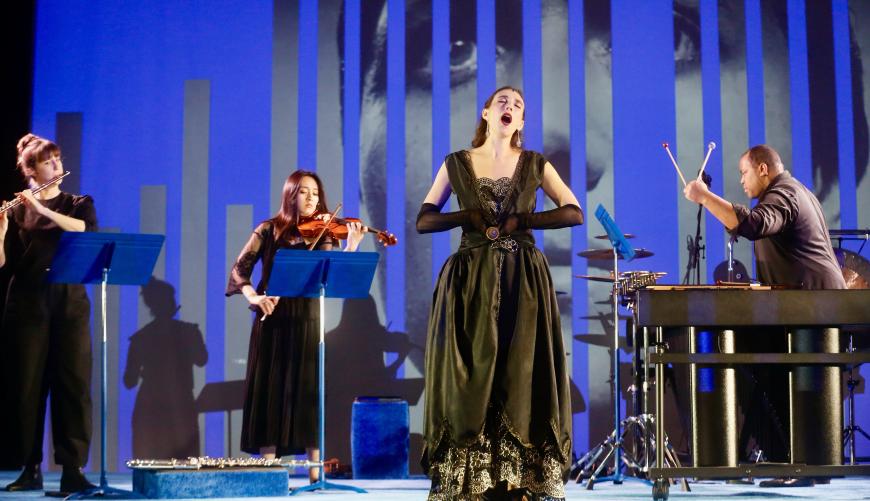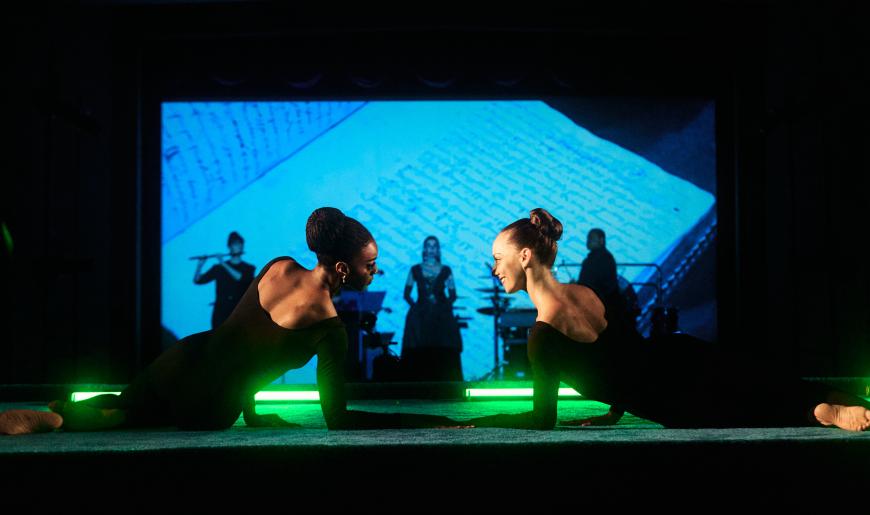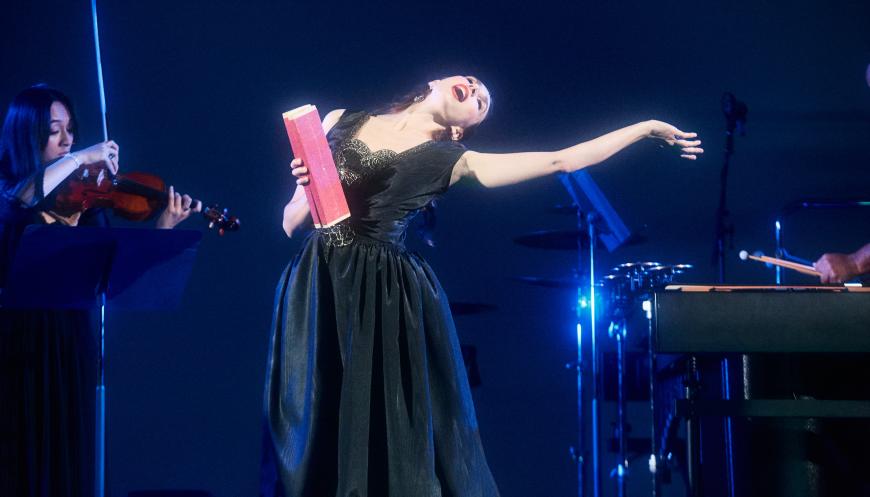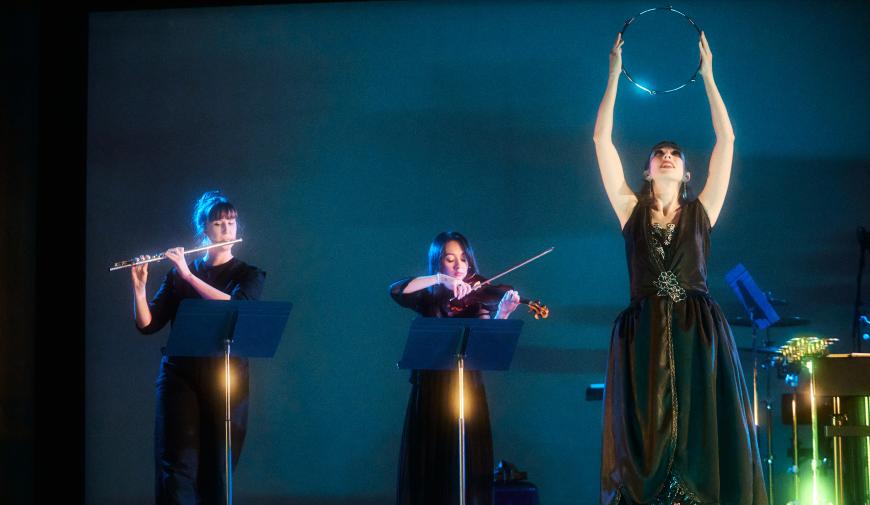
Since its founding in 1979, Long Beach Opera (LBO) has pushed the boundaries of the form so often that experimental is the norm. That tradition continued brilliantly on Saturday with the West Coast premiere of Ipsa Dixit, Kate Soper’s 2017 “philosophy-opera.”
Performed on the stage of the Art Theatre in Long Beach, a former silent movie palace, this mad tea party of an opera all begins with a soprano, dressed in black and ringing a bell like some Victorian schoolmarm, posing the age-old question, “What is art?”
For director James Darrah, music director Christopher Rountree, and choreographer Janet Eilber (longtime artistic director of the Martha Graham Dance Company), these three words serve as the starting gun for a 90-minute odyssey combining the intellectual complexities of a Socratic dialogue with a disconcerting Alice in Wonderland sense that you’ve just been plunged down the rabbit hole.

The Latin ipsa dixit translates as “she herself said it.” The phrase also implies that whatever the speaker says is true simply because she says it — facts notwithstanding.
In Through the Looking-Glass, Lewis Carroll posits it this way:
‘When I use a word,’ Humpty Dumpty said in rather a scornful tone, ‘it means just what I choose it to mean — neither more nor less.’
‘The question is,’ said Alice, ‘whether you can make words mean so many different things.’
‘The question is,’ said Humpty Dumpty, ‘which is to be master — that’s all.’”
There is no question as to who is the master of the word in Ipsa Dixit. Throughout the performance, soprano Anna Schubert commands the stage like a force of nature, part Oxford don, part commedia dell’arte clown, part Wicked Witch of the West delivering Soper’s octave-leaping score in the speech-song (sprechstimme) style pioneered by Arnold Schoenberg. It’s a role of mind-bending vocal demands, and Schubert is an ideal interpreter.

The opera is divided into six sections with headings like “Poetics,” “The Crito,” “Cipher,” and “Metaphysics,” and Schubert is accompanied by three musicians who’ve all played with the new-music ensemble Wild Up: flutist Rachel Beetz, violinist Mona Tian, and percussionist Sidney Hopson.
In addition, Darrah expands the theatrical spectrum of Soper’s creation to include choreography by Eilber for a pair of lithe and sensual Graham company members: Anne Souder and Leslie Andrea Williams. Beautifully costumed by Molly Irelan in flowing black brocade skirts, the dancers accentuate the drama with movements extracted from Graham’s vocabulary of classical gestures. There are also moments when Eilber playfully allows the movement to slip into the realm of tongue-in-cheek tragic parody.
As an homage to the Art Theatre’s silent-movie history and Soper’s extensive references to classical tragedy, Darrah has Carl Theodor Dreyer’s The Passion of Joan of Arc projected in the background, allowing Renée Jeanne Falconetti, with tear-streaked face and imploring eyes, to serve as the opera’s ideal tragic muse.
Soper’s encyclopedic libretto includes classical as well as contemporary observations about the power of language, taken from Plato and Aristotle, Sigmund Freud, and contemporaries like writer Lydia Davis and artist Jenny Holzer, along with Soper’s own journal-style entries.
Composed between 2010 and 2016 and later released as a recording featuring Soper and the Wet Ink Ensemble, Ipsa Dixit was a finalist for the 2017 Pulitzer Prize in Music. (The top prize that year went to Du Yun for her opera Angel’s Bone.)

Soper’s score unfolds as a sequence of six quartets and duets that incorporate a musical vocabulary as dense as the intellectual nature of the material and as jagged as the shards of a broken mirror. The duets tend toward the lighter, more lyrical, and crystalline end of the spectrum. Led by Schubert’s vocals, the music rises in volcanic crescendos, then turns poetic and conversational, Schubert’s voice melding with the soft tones of the marimba, the airy tingle of bells, purring flutters from the flute, and languid expressions from the violin.
In a playful moment, during a discourse on the deconstructionist use of language, Soper literally deconstructs the instruments, leaving the flutist only one third of her instrument and the violinist without a bow. To their credit, all three musicians happily play dual roles as musicians and characters.
Throughout the performance, the dancers move between an awkwardly placed platform in the middle of the theater and the stage. And as the opera nears its conclusion, Souder and Williams perform a lyrical pas de deux to the words of Sara Teasdale’s poem “Moods” (“I am the still rain falling … I am the brown bird pining”), the billowing fabric of their skirts an homage to Graham’s Letter to the World. They exit, only to return moments later as a pair of giddy, glittery 1920s moviegoing flappers, popcorn in hand.
Ipsa Dixit is a thought-provoking operatic mind trip, more so in Darrah’s multimedia production, which catches all of the work’s moods. It can be deeply intellectual one moment and sweetly endearing the next, and Soper is witty and clever enough to know when to poke a little fun at her endeavor. It must be so, if she writes it.
LBO presents two more performances of Ipsa Dixit, June 8 and 9.




